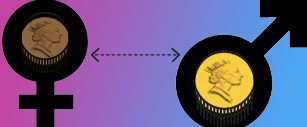A law was introduced last year that made it illegal to pay men more than women.
In Iceland, it has been illegal to pay men more than women for over a year now. The legislation, which came into effect on 1 January, 2018, requires firms that employ more than 25 people to obtain a government certificate demonstrating pay equality, or else face fines.
Such an initiative from policymakers would surely be welcome in South Africa given that, according to the Code for Africa gender gap calculator, a man in South Africa earns 72 percent more than a woman on average.
The tool uses Estimated Earned Income data from the World Economic Forum's (WEF) Global Gender Gap Report 2018. The calculator isn’t designed to give breakdowns for each industry but instead captures the average gender gap across all sectors within a country.
With such a progressive law in place, it is no surprise that the aforementioned report names Iceland as the most gender-equal country to date after having closed over 85 percent of its overall gender gap. Iceland is followed by Norway (83.5 percent), Sweden and Finland (82.2 percent).
Iceland has, in fact, been ranked by the WEF as the world’s most gender-equal country for the past 10 years, and South Africa can certainly take a page from its book in addressing its women emancipation agenda.












